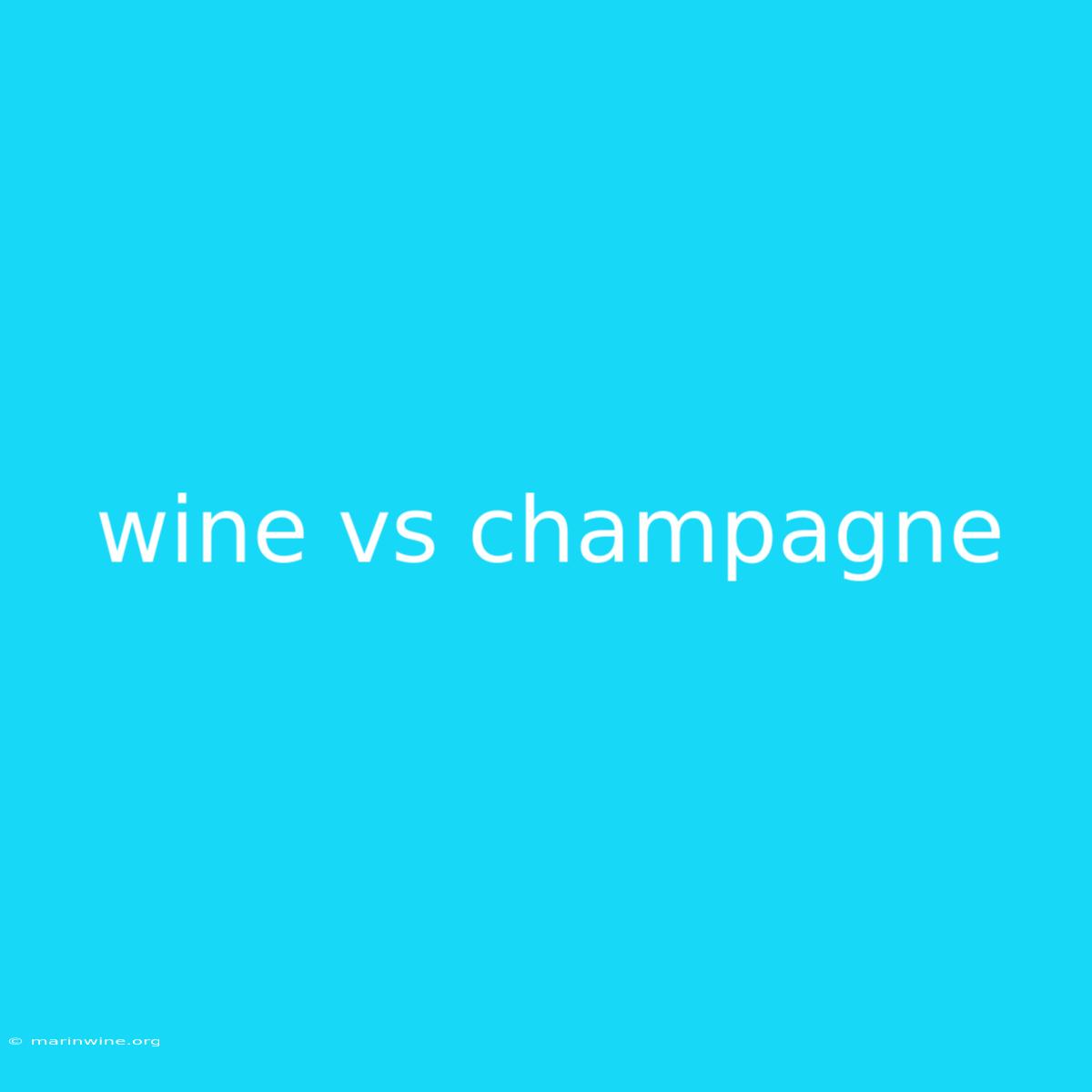Wine vs. Champagne: Uncorking the Differences
Have you ever wondered what truly sets champagne apart from other wines? It’s not just the celebratory fizz, but a whole host of factors that contribute to its unique character. Let’s dive into the world of sparkling delights and uncover the secrets behind wine vs. champagne.
Why It Matters: Understanding the difference between wine and champagne helps you appreciate both beverages more deeply. This knowledge empowers you to choose the perfect drink for any occasion, from intimate gatherings to grand celebrations.
Key Takeaways:
| Feature | Wine | Champagne |
|---|---|---|
| Origin | Grapes from various regions worldwide | Chardonnay, Pinot Noir, and Pinot Meunier grapes from the Champagne region of France |
| Production | Fermented once | Fermented twice, with the second fermentation occurring in the bottle |
| Taste | Varies widely depending on grape variety, region, and production methods | Typically dry, complex, with notes of citrus, bread, and yeast |
| Serving Temperature | Varies, typically chilled | Served chilled, ideally between 45-50°F |
| Price | Wide range of price points | Generally more expensive due to the complex production process |
Wine
Introduction
Wine is a fermented beverage produced from grapes. The process involves crushing the grapes, extracting the juice, and allowing it to ferment naturally with yeast. This fermentation converts sugar into alcohol and carbon dioxide, resulting in a variety of flavors and aromas.
Key Aspects:
- Grape Varieties: Wine can be made from hundreds of different grape varieties, each contributing unique characteristics to the final product.
- Regions: The region where the grapes are grown significantly impacts the taste of the wine. Soil type, climate, and vineyard practices all contribute to the final product.
- Production Methods: Different production methods, such as oak aging, blending, and filtration, can significantly alter the flavor profile of wine.
Champagne
Introduction
Champagne, on the other hand, is a sparkling wine produced exclusively in the Champagne region of France. It is characterized by its unique production method, involving a secondary fermentation in the bottle, which creates the signature bubbles.
Key Aspects:
- Specific Grapes: Champagne is typically made from Chardonnay, Pinot Noir, and Pinot Meunier grapes, each contributing its own distinct flavor profile to the final blend.
- Méthode Champenoise: The traditional production method, known as Méthode Champenoise, involves a secondary fermentation in the bottle, leading to the formation of carbon dioxide bubbles.
- Aging: Champagne is aged for extended periods, often for several years, developing its complex and nuanced flavor profile.
The Connection Between Wine and Champagne
While both beverages are fermented from grapes, champagne stands apart due to its specific production process and the unique qualities imparted by the Champagne region. Understanding the history and production methods behind champagne allows us to appreciate its complexity and sophistication.
Sparkling Wine vs. Champagne
While the term "sparkling wine" is often used interchangeably with "champagne," there is a significant distinction. Champagne refers exclusively to sparkling wine produced in the Champagne region of France using the traditional Méthode Champenoise.
Other sparkling wines produced using similar methods, but outside the Champagne region, are often referred to as Crémant or Prosecco depending on their region of origin.
FAQ
Q: Can I drink champagne with any meal?
A: Champagne pairs well with a wide range of dishes, from seafood and appetizers to richer dishes like chicken and pork. However, it is best to avoid pairing it with very spicy or intensely flavored foods, as the delicate flavors of the champagne may be overpowered.
Q: How long can I keep a bottle of champagne open?
A: Opened champagne will stay fresh for a few days if stored properly. However, the best quality is typically enjoyed within 24 hours. To preserve the bubbles, keep the bottle tightly sealed in the refrigerator.
Q: Can I use champagne for cooking?
**A: ** While champagne is a delicious beverage, its high cost often makes it impractical for cooking. However, you can use other sparkling wines, like Prosecco, for cooking purposes.
Q: What makes champagne more expensive than other sparkling wines?
A: The higher cost of champagne is a result of several factors, including the strict regulations and production methods involved in its production. The long aging process, the use of premium grapes, and the meticulous craftsmanship required to produce champagne all contribute to its higher price tag.
Tips for Enjoying Champagne
- Serve it chilled: Ideally, champagne should be served between 45-50°F. This temperature helps to preserve the delicate bubbles and enhance the flavors.
- Use the right glass: A champagne flute is the traditional glass for serving champagne. Its narrow shape helps to preserve the bubbles and concentrate the aroma.
- Pair it with the right food: Champagne pairs well with a wide range of dishes, from seafood and appetizers to richer dishes like chicken and pork.
- Enjoy it responsibly: Champagne is a delicious and celebratory drink, but remember to enjoy it responsibly.
Summary
The world of wine and champagne is vast and diverse. While wine encompasses a wide range of flavors and styles, champagne stands out as a unique and celebratory beverage. Understanding the key differences between these two sparkling delights empowers you to appreciate them more deeply and choose the perfect drink for any occasion.

